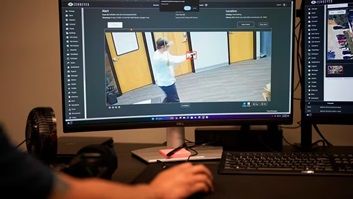Kansas could soon offer up to $5 million in grants for schools to outfit surveillance cameras with artificial intelligence systems that can spot people carrying guns. But the governor needs to approve the expenditures and the schools must meet some very specific criteria.
The AI software must be patented, “designated as qualified anti-terrorism technology,” in compliance with certain security industry standards, already in use in at least 30 states and capable of detecting “three broad firearm classifications with a minimum of 300 subclassifications” and “at least 2,000 permutations,” among other things.
Only one company currently meets all those criteria: the same organisation that touted them to Kansas lawmakers crafting the state budget. That company, ZeroEyes, is a rapidly growing firm founded by military veterans after the fatal shooting at Marjory Stoneman Douglas High School in Florida.
The legislation pending before Kansas Gov. Laura Kelly highlights two things. After numerous high-profile shootings, school security has become a multibillion-dollar industry. And in state capitols, some companies are successfully persuading policymakers to write their particular corporate solutions into state law.
ZeroEyes also appears to be the only firm qualified for state firearms detection programs under laws enacted last year in Michigan and Utah, bills passed earlier this year in Florida and Iowa and legislation proposed in Colorado, Louisiana and Wisconsin.
On Friday, Missouri became the latest state to pass legislation geared toward ZeroEyes, offering $2.5 million in matching grants for schools to buy firearms detection software designated as “qualified anti-terrorism technology.”
“We’re not paying legislators to write us into their bills,” ZeroEyes co-founder and Chief Revenue Officer Sam Alaimo said. But “if they’re doing that, it means I think they’re doing their homework, and they’re making sure they’re getting vetted technology.”
ZeroEyes uses artificial intelligence with surveillance cameras to identify visible guns, then flashes an alert to an operations center staffed around the clock by former law enforcement officers and military veterans. If verified as a legitimate threat by ZeroEyes personnel, an alert is sent to school officials and local authorities. The goal is to “get that gun before that trigger is squeezed, or before that gun gets to the door,” Alaimo said.
Few question the technology. But some do question the legislative tactics. The super-specific Kansas bill — particularly the requirement that a company have its product in at least 30 states — is “probably the most egregious thing that I have ever read” in legislation, said Jason Stoddard, director of school safety and security for Charles County Public Schools in Maryland.








